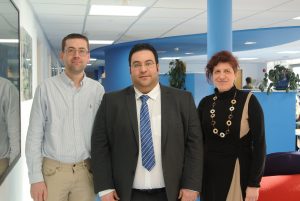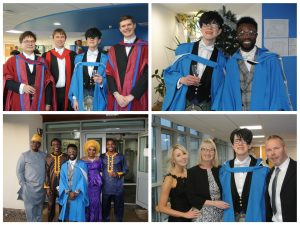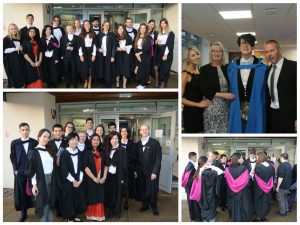A paper describing the work of our MSc student Xingzhi Yue and PhD student Neofytos Dimitriou, supervised by Oggie Arandjelovic and in collaboration with the School of Medicine, gets the best paper finalist award at the latest International Conference on Bioinformatics and Computational Biology (BICOB 2019). The key contribution of the work is a novel deep learning based algorithm for the analysis of extremely large pathology image slides, capable of automating and improving colorectal cancer prognosis.
Author: lisa
Distinguished Lecture Series: Formal Approaches to Quantitative Evaluation
Biography:
Jane Hillston was appointed Professor of Quantitative Modelling in the School of Informatics at the University of Edinburgh in 2006, having joined the University as a Lecturer in Computer Science in 1995. She is currently Head of the School of Informatics. She is a Fellow of the Royal Society of Edinburgh and Member of Academia Europaea. She currently chairs the Executive Committee of the UK Computing Research Committee.
Jane Hillston’s research is concerned with formal approaches to modelling dynamic behaviour, particularly the use of stochastic process algebras for performance modelling and stochastic verification. The application of her modelling techniques have ranged from computer systems, to biological processes and transport systems. Her PhD dissertation was awarded the BCS/CPHC Distinguished Dissertation award in 1995 and she was the first recipient of the Roger Needham Award in 2005. She has published over 100 journal and conference papers and held several Research Council and European Commission grants.
She has a strong interest in promoting equality and diversity within Computer Science; she is a member of the Women’s Committee of the BCS Computing Academy and chaired the Women in Informatics Research and Education working group of Informatics Europe 2016—2018, and during that time instigated the Minerva Informatics Equality Award.
Formal Approaches to Quantitative Evaluation
Qualitative evaluation of computer systems seeks to ensure that the system does not exhibit bad behaviour and is in some sense “correct”. Whilst this is important it is also often useful to be able to reason not just about what will happen in the system, but also the dynamics of that behaviour: how long it will take, what are the probabilities of alternative outcomes, how much resource is used….? Such questions can be answered by quantitative analysis when information about timing and probability are incorporated into models of system behaviour.
In this short series of lectures I will talk about how we can extend formal methods to support quantitative evaluation as well as qualitative evaluation of systems. The first lecture will focus on computer systems and a basic approach based on the stochastic process algebra PEPA. In the second lecture I will introduce the language CARMA which is designed to support the analysis of collective adaptive systems, in which the structure of the system may change over time. In the third lecture I will consider systems where the exact details of behaviour may not be known and present the process algebra ProPPA which combines aspect of machine learning and inference with formal quantitative models.
Timetable:
Lecture 1: 9:30 – 10:30 – Performance Evaluation Process Algebra (PEPA)
Coffee break at 10:30 – 11:15
Lecture 2: 11:15 – 12:15 – Collective Adaptive Resource-sharing Markovian Agents (CARMA)
Lecture 3: 14:15 – 15:15 – Probabilistic Programming for Stochastic Dynamical Systems (ProPPA)
Venue: Upper and Lower College Halls
Event details
- When: 8th April 2019 09:30 - 15:30
- Where: Lower College Hall
- Series: Distinguished Lectures Series
- Format: Distinguished lecture
Encoding Egyptian quadrats in Unicode
Unicode 12, released 5th March 2019, includes 9 control characters for Ancient Egyptian hieroglyphic text. These resulted from an initiative by Dr. Mark-Jan Nederhof (St Andrews) and Egyptologists at the University of Liège, CNAM (Paris) and the Berlin-Brandenburgische Akademie der Wissenschaften, in collaboration with Unicode experts. The control characters allow hieroglyphs to be arranged horizontally and vertically much as in original inscriptions. This removes the foremost obstacle to adoption of Unicode in Egyptology.
The control characters:
https://www.unicode.org/charts/PDF/Unicode-12.0/U120-13430.pdf
Although existing fonts are not yet able to interpret the control characters directly, hieroglyphic text can now be displayed on web pages with the help of JavaScript:
https://mjn.host.cs.st-andrews.ac.uk/egyptian/res/js/
Lao Characters for Pali added to Unicode 12
Congratulations to Vinodh Rajan, Ben Mitchell, Martin Jansche and Sascha Brawer on their successful proposal for additions to the repertoire of ISO/IEC 10646, which will see Pali letters added to Lao in Unicode 12. As a result, it is now possible to write both Pali/Sanskrit in Lao and represent the entire Tripitaka in the Lao script. The proposal (https://bit.ly/2TE2XKJ) submitted in 2017 was finally added to the Unicode standard this year.
Vinodh explained that the proposal allows four things. Firstly, one can now transcribe liturgical Pali (the liturgical language of Theravada Buddhism) texts and by extension the whole Pali Tripitaka (the Theravada Buddhist canon) in the Lao script without any distortion, providing lay people accurate access to these liturgical texts. Previously, the texts had to go through some sort of distortion due to the lack of appropriate characters, which means they had to be approximated. Secondly, it allows people who would want to use etymological orthography for Lao (it currently uses a phonemic orthography) access to the necessary additional characters. Thirdly, there are several books printed (mostly in the 1930’s) using the expanded alphabet that need to be eventually digitized. This will enable their proper digitization by allow plain-text representation of all the Lao characters. Lastly, it will improve the transliteration accuracy between Lao and neighboring scripts like Thai and Khmer.
The expanded Lao alphabet can be found here:
http://aksharamukha.appspot.com/#/describe/LaoPali
Vinodh, a St Andrews Computer Science alumnus completed his PhD in 2016. His thesis, Quantifying scribal behavior : a novel approach to digital paleography was supervised by Dr Mark-Jan Nederhof.
PhD viva success: Hussein Bakri
Congratulations to Hussein Bakri, who successfully defended his thesis today. He is pictured with Internal examiner Professor Ian Miguel and external examiner Dr Maria Economou, from the University of Glasgow.
Dr Juan Ye: Lifelong Learning in Human Activity Recognition
Dr Juan Ye will be running an online event for IEEE SMC (Systems, Man and Cybernetics Society) on Lifelong Learning. The technical seminar, designed to focus on future research trends in human activity recognition, will take place on Friday 1st February from 2.00pm – 3.00pm.

Seminar Details: Human activity recognition systems will be increasingly deployed in real-world environments and for longer periods of time. This significantly challenges current approaches to human activity recognition, which have to account for changes in activity routines, evolution of situations, and of sensing technologies. Driven by these challenges, this webinar will argue the need to move beyond learning to lifelong machine learning – with the ability to incrementally and continuously adapt to changes in the environment being learned. We will introduce a conceptual framework for lifelong machine learning to structure various relevant proposals in the area, and identify some key research challenges that remain.
Read more about the event and joining instructions through IEEE online.
Population and Behavioural Sciences Division workshop and seminar
Seminar Details
Using Intensive Longitudinal Methods to Study Fear of Breast Cancer Recurrence in Everyday Life
Jean-Philippe Laurenceau, Ph.D.
Venue: Seminar room 1
Date: 14 January 2019
Time: 3-4pm.
Intensive longitudinal methods (also called experience sampling, daily diary, or ecological momentary assessment methods) allow researchers to study people’s health-related behavior, thoughts, and emotions as experienced in their natural contexts. Such data can reveal life as it is actually lived and provide insights that are not possible using conventional experimental or survey research methods. Dr. Laurenceau will review several findings from a study consisting of twice daily assessments of fear of cancer recurrence over 21 days obtained from breast cancer patients and their spouses/partners at key points in the cancer survivorship trajectory. This type of intensive longitudinal research design allows estimation of effects reflecting within-person change (versus between-person differences) in health-related outcomes and supports inferences that have high ecological validity, clinical relevance, and patient focus.
Refreshments will be served from 2.45pm.
Please note if you would like to attend the workshop, please let Karen Hunter know so that she can ensure there is enough space.
Workshop Details
Introduction to Analysing Intensive Longitudinal Data
Jean-Philippe Laurenceau, Ph.D.
Venue: Level 3 meeting room
Date: 14 January 2019
Time: 1-2pm
Intensive longitudinal methods (also called experience sampling, daily diary, or ecological momentary assessment methods) produce data that allow researchers to study people’s behavior, thoughts, and emotions as experienced in their natural contexts. The multilevel or mixed-effects model for longitudinal data is a flexible analytic tool that can take account of complexities stemming from the multiple levels of analysis and temporal dependencies in the data. The goal of this workshop is to provide an overview of a full-cycle treatment of two fundamental research questions that can be addressed using intensive longitudinal methods: (a) What is the time course of the outcome variable, and (b) what is the within-person causal process that underlies the time course? A full-cycle treatment will take workshop participants through five stages of answering each research question: (1) Design study & collect data, (2) Visualize, (3) Analyze, (4) Write up results, and (5) Power the next study. Material for this workshop will be drawn from introductory sections of the presenter’s 2013 Guilford Press book “Intensive Longitudinal Methods: An Introduction to Diary and Experience Sampling Research” (www.intensivelongitudinal.com). Using SPSS and Mplus statistical software, attendees can follow along with the examples in the workshop handout or conduct analyses on their own laptops.
Dr. Jean-Philippe Laurenceau is Unidel A. Gilchrist Sparks III Chair in the Social Sciences and Professor of Psychological & Brain Sciences at the University of Delaware. He is also Senior Research Scientist at CCHS’s Helen F. Graham Cancer Centre and Research Institute. He completed his B.A. cum laude at Cornell University and received his master’s and doctorate degrees from The Pennsylvania State University. Recently, Dr. Laurenceau has been studying how patients and spouses/partners cope with and maintain connection amid health-related adversity, including breast cancer and diabetes. He was an appointed member of a social and behavioural sciences grant review panel of the National Institutes of Health and has been PI or co-I on several research projects funded by the National Institute of Mental Health, National Institute of Child Health and Human Development, and the National Cancer Institute. He regularly teaches methodological workshops at the University of Michigan’s Summer Program in Quantitative Methods of Social Research and at Penn State’s Summer Institute for Longitudinal Methods. Dr. Laurenceau is co-author of the book “Intensive Longitudinal Methods: An Introduction to Diary and Experience Sampling Research” (2013, Guilford Press).
Event details
- When: 14th January 2019
- Where: N Haugh, St Andrews
- Format: Seminar
Job vacancies: Lecturers in Computer Science
The School of Computer Science is recruiting two new Lecturers as part of a large on-going expansion of our academic staff.
You will be a scholar with a growing international research reputation in Computer Science and a commitment to delivering high quality teaching within the broad field of Computer Science and its applications. The successful candidate will be expected to have a range of interests, to be active in research publication that strengthens or complements those in the School and to be capable of teaching the subject to undergraduate and taught postgraduate students who come to us with a wide range of backgrounds.
Candidates should hold a PhD in a cognate discipline. Excellent teaching skills and an interest in promoting knowledge exchange are essential. You should also have some familiarity with grant seeking processes in relation to research councils and other sources.
Closing date: 14th January 2019
Informal enquiries can be directed to Professor Simon Dobson (hos-cs@st-andrews.ac.uk) or Dr Dharini Balasubramaniam (dot-cs@st-andrews.ac.uk).
Find out more about the vacancies further particulars on the recruitment website.
Job vacancies: Interdisciplinary Data Scientists
The Schools of Medicine and Computer Science are seeking to appoint three highly motivated data scientists with a passion for computer vision and deep learning, and specifically their application to medical imaging. The data scientists will be based in the Schools of Computer Science and Medicine at the University of St Andrews and will work on a national Innovate UK funded initiative to create a pan Scotland Industrial Centre for AI Research in Digital Diagnostics (iCAIRD).
The successful candidates will have the opportunity to work alongside and learn from clinicians, industrial experts from Philips Healthcare and academics to help develop artificial intelligence solutions for the automatic reporting of cancer diagnoses in endometrial and cervical cancer. The main duties of the role will involve being an active member of an interdisciplinary team of scientists to help develop deep learning algorithms, within industry standard guidelines, to analyse patient samples in a manner that allows rapid clinical transfer. This work will therefore have the opportunity to impact both patient welfare and relieve pathologist work burden.
Applicants should have experience in machine learning, demonstrable experience in computer programming languages and an interest in the medical applications of computer science. The candidates would benefit from a track record in scientific writing and working in interdisciplinary teams as well as experience in computer vision.
The posts are full time and over a period of 36 months.
Closing Date: 18 January 2019
Find out more about the vacancies further particulars on the recruitment website.
December Graduation 2018
Congratulations to the Masters Class of 2018, and PhD students Dr Daniel Rough and Dr Adeola Fabola who graduated last week. The School also celebrated the Installation of Professor Adam Barker. Students and guests were invited to a reception in Computer Science after the ceremony to celebrate their achievement and reflect on their time in the School.
Our graduates move on to a wide variety of interesting and challenging employment and further study opportunities, and we wish them all well with their future careers.





